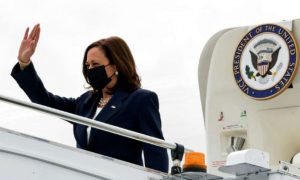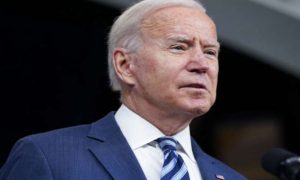The fall of Kabul shows how divorced from reality Biden and America’s elites really are
On April 17, 2002, following the decisive triumph of American forces over the Taliban, then-President George W. Bush gave a speech at the Virginia Military Institute in which he looked ahead to “the rebuilding of Afghanistan.” Invoking the spirit of George Marshall and the great builders of the postwar world, Bush stated that military victory wasn’t enough: It had to be followed by a “moral victory.” Peace, he maintained, would be achieved by “helping Afghanistan develop its own stable government,” but also by improving education “for boys and girls,” transitioning the economy away from its reliance on opium, fixing the road system, delivering better medical care.
Over the next two decades, the U.S. government lavished more treasure on “nation-building” than war-fighting in Afghanistan. By the end, the amount exceeded the Marshall Plan, even adjusted for inflation. I believe the goals, which included the liberation of Afghan women and the modernizing of Afghan society, were unambiguously moral. Yet, as we now know, there
will be no moral victory. The U.S. intervention in Afghanistan is ending in moral disgrace and human tragedy.
The capital city of Kabul surrendered to the Taliban without firing a shot. The ostensible president of the country departed without explanation. Afghan friends and employees of the U.S. government—the people who have shouldered the responsibility for nation-building—are either fleeing their homes in desperation or at the mercy of a hostile and implacable regime. Even as this sorry incident staggers on to its inevitable conclusion, it isn’t too soon to seek reasons and assign responsibility.
A Different Species From the Postwar Giants
Compared to the post-World War II reconstruction effort, our attempt to rebuild Afghanistan went terribly wrong from the start. Afghanistan was never going to be Germany or Japan. Cultures are variably tolerant to the strains and demands of modernity. But can we explain the Afghan disaster solely in terms of the inflexibility of the country’s local culture, coupled with our profound ignorance of it?
We tend to forget that there was another culture at play. The norms that framed American society in 1945 had radically changed by 2002. Twenty years later, it’s as if we have evolved into a different species. Douglas MacArthur wielded more power than any divine emperor over postwar Japan. He became a literal dictator, in the sense that he dictated that country’s democratic constitution—a document that remains in force to this day. Secretary of State George C. Marshall’s idea was unprecedented in history: The conquering nation would, in essence, pay reparations to the vanquished. The global prosperity that ensued is with us still.
Try to imagine our current political class displaying such confidence while deploying raw power and violating conventional wisdom in pursuit of geopolitical objectives. It couldn’t happen. Elites today are paralyzed with misgivings about the nature of the system they manage. They engage in moralistic campaigns against ineffable evils, but the world at large frightens them because of its terrible reality.
The fall of Kabul was an intrusion of hard truth into the gaseousness of the American political environment. It felt indecent. President Biden responded by flying to Camp David for the weekend. The rest of the political class largely looked the other way.
In part, the gulf between postwar outcomes reflected the character of the two conflicts. World War II was a war of extermination fought by young men conscripted out of the general population. Americans died in great numbers, even as we flattened Berlin, Dresden, Tokyo, Hiroshima. More than 20,000 U.S. service personnel fell in a single three-month battle over the island of Okinawa in 1945. The authority of the great proconsuls like MacArthur and Marshall rested on a universal awareness of American ruthlessness and courage.
The total number of U.S. military killed during 20 years of fighting in Afghanistan is 2,372. Those who died there belonged to a volunteer force whose ideals sound increasingly antiquated and whose activities seem, to many politicians, somewhat barbaric. Whether this counts as moral progress I leave for finer spirits to decide—but we can be sure that nobody, friend or foe, will today budge half a step out of their way out of respect for the ruthlessness of the United States.
How an Existential Threat Became a Forever War
The chief reason for invading Afghanistan wasn’t moral but existential. The Taliban had turned the country into a vast training camp for terrorist groups like al-Quaida. Plans for the 1998 bombings of the U.S. embassies in Kenya and Tanzania, in which 13 Americans died, were hatched from this safe haven. President Bill Clinton’s attempt at retaliation, the sadly misnamed Operation Infinite Reach, merely pounded the desert of Afghanistan’s Khost Province with cruise missiles. Those were the carefree days of the ‘90s. Nothing was taken too seriously.
The horror of Sept. 11, 2001, changed that. For the first time, Americans felt vulnerable at home—and fear concentrated minds. For the last time, the White House, Congress and the public were united in purpose. The joint resolution authorizing military intervention passed by 98-0 in the Senate and 420-1 in the House. Its language said nothing about moral victories but spoke of the “treacherous violence” perpetrated on 9/11 and empowered the president “to use all necessary and appropriate force against those nations, organizations, and persons” involved in the attack. We entered Afghanistan in an act of self-defense.
Unity of purpose did not long outlast military victory and disintegrated entirely during the controversy over the Iraq invasion in 2003. The United States had assumed responsibility for the fate of a large, poor, ungovernable country. Meanwhile, the Taliban still threatened from the hinterlands. What was now the American mission in Afghanistan?
Barack Obama put his faith in a fictitious “rules-based” international order and detested military action. His instinct was to withdraw from Afghanistan as he eventually did from Iraq. But he perceived an existential danger as a consequence of retreat in Afghanistan—as he did not in Iraq—and he played against type by temporarily increasing the American presence in the country.
Addressing his fellow anti-war Democrats, and anticipating an accusation often heard today, President Obama explicitly rejected any parallel to the Vietnam conflict asserting that “unlike Vietnam, the American people were viciously attacked from Afghanistan, and remain a target for those same extremists who are plotting along its border.” You can hear the fear of another 9/11 lingering in those words.
Donald Trump believed in an equally fictitious zero-sum global hustle, in which every nation’s gain meant another’s loss. He felt that the U.S. had been bamboozled into holding the bag in Afghanistan, and he wanted out. Trump began negotiations with the Taliban and set an arbitrary deadline for withdrawal of May 2021. It is unclear to me whether he considered the possibility of a terrorist backlash—or, if he did, how it figured in his calculations. His is a strange and contorted intellect. For all that, he bears some of the responsibility for the ensuing failure.
But intent and even policy are one thing, execution another. We don’t know if or how Trump would have executed his withdrawal. He hated losing personally, and his presidency was staked on making America great again. I find it hard to believe that he would have embraced a humiliating defeat as passively as Biden has done. Of course, we will never know. All we can say is that the catastrophe didn’t happen on his watch.
During the 2020 presidential campaign and again in a policy statement in April 2021, Joe Biden seemed to suggest that he wanted U.S. troops out of Afghanistan without ceding full control of the country to the Taliban or tolerating a terrorist presence. On no occasion did he explain how he would carry out this “just right” maneuver, how he would succeed where all his predecessors had failed. Given the unfolding chaos and panic in Kabul, I think it’s safe to say that Biden had simply been painting word pictures that appealed to his fantasy life.
By Inauguration Day 2021, Afghanistan had become an unpopular but mostly forgotten war. Fewer Americans were dying there: 46 between 2018 and 2020. (As a point of comparison, 336 homicides were committed in Chicago in the first six months of 2021, without creating much of a policy stir.) Those who thought about the matter tended to ask, in frustration, whether the only choice was between a “forever war” and a “massacre of our allies.”
That is the wrong question. We should have asked instead whether we are still willing to do what we can to avoid the possibility of another 9/11.
If the answer is “no,” then withdrawal makes strategic sense, even if the tactics chosen by the Biden administration have been worst in class. But if you believe, as I do—and as Presidents Obama, Trump and Biden at different times have maintained—that the risk of a major terror strike on U.S. soil remains a reality, then the answer has to be that we should do what it takes, for as long as it takes, to prevent that from happening. In either case, the decision needed to be made with a clear understanding of the human and geopolitical consequences—something wholly missing from the present exercise.
An Administration Divorced From Cause and Effect
For many years after the end of our nation’s most divisive war, experts argued heatedly about the “lessons of Vietnam.” The lessons of Afghanistan, however, are plain enough. Our elected leaders and the people who advise and support them don’t have a clue about how the world works. They dwell in a bubble of invented dragons they wish to slay, like “systemic racism” or “Islamophobia,” and they preen on the national stage impersonating the obscure virtues they wish to be applauded for—“gender awareness,” for example, or wearing surgical masks. Absorbed in their posturing and playacting, they have lost the capacity to manage events and recognize a material threat.
Virtually every statement by the Biden administration on Afghanistan has been falsified by reality. As late as July 8, the president himself dismissed the idea that the Afghan government might collapse without U.S. assistance. “There is going to be no circumstance where you see people lifted off the roof of an embassy,” he declared, in what might go down as the most inaccurate foreign policy prediction ever uttered by a chief executive. “The likelihood that you’re going to see the Taliban overrunning everything and owning the whole country is highly unlikely.”
On July 7, Secretary of State Antony Blinken insisted that the U.S. still had a shot at moral victory: “We are not withdrawing, we are staying, the embassy is staying, our programs are staying.” Asked about the possibility of an Afghan collapse, he replied, “I don’t think it’s going to be something that happens from a Friday to a Monday.” In fact, Kabul was lost in 24 hours.
Even as the Taliban entered the city and evacuation helicopters hovered over the U.S. Embassy, Blinken could still pretend that “this is not Saigon.” The difference? “We went to Afghanistan 20 years ago with one mission, and that mission was to deal with the folks who attacked us on 9/11, and we have succeeded in that mission.” But that, of course, was predicated on dismantling the Taliban. When pressed about whether the country would revert to a “hotbed of terrorism,” Blinken actually based his argument on the Taliban’s “self-interest”—by which he meant, I suppose, that they should fear the return of the stampeding Americans.
The extent to which our intelligence and military services have been implicated in this tragedy of errors is unclear. I have heard it both ways. Certainly, the rot of unreality had spread all the way to the ground in the bureaucracy. To cite just one example: The U.S. Embassy in Kabul was posturing about its righteous support of “LGTBI people” just two months before it abandoned those people to the tender mercies of the Taliban. Scapegoating CIA and the Pentagon, in any case, is a venerable Washington tradition. If Biden and his coterie ever regain their wits, they are sure to attempt something of the kind.
But this was a failure from the top. Because the war in Afghanistan rated poorly in opinion polls, the president imagined that withdrawal would earn him a cheap political victory. Because he and his advisers confuse reality with wish-fulfillment, they had no conception of the bloody and horrific mess they were about to unleash. Because the mental life of our elites is stuck in the 20th century, they couldn’t foresee the flood of heartbreaking images on social media that would transform a decision about an obscure and distant land into a potentially fatal political wound.
Collision with events has left the Biden administration in a condition similar to traumatic shock. But nothing will change. The elites are always surprised, yet they never learn. They are desperate to strut on that high stage, even if the theater is engulfed in flames. In plain words, they are afraid of the truth, of the true measure of themselves in the mirror of reality. So, they weave a web of fantasy over a harsh and alien world, and let others pay the price.
President Biden’s Aug. 16 speech on the crisis was faithful to these escapist principles. He acknowledged no mistakes and proposed no new fixes. He said, “The buck stops with me,” but he blamed Trump for the withdrawal deadline, the Afghan military for refusing to fight, the Afghan government for encouraging people to stay and the Afghan people for not running fast enough. It was an astonishing performance. Biden looked like what he was—an old man tangled up in confused memories of the Vietnam War. The speech lasted only 19 minutes. Afterwards, without taking questions, he fled back to the happy bubble of Camp David.
For a long time, American politics have been about nothing. We are fat and secure and can probably afford the risk. However, that changes at the water’s edge. American weakness and delusion open the door to global actors whose fantasies favor more brutal themes. Already the Chinese are drawing parallels between Afghanistan and Taiwan. We can hope it’s just talk. But as we endure a rout of historic proportions, overseen by an administration so visibly divorced from cause and effect, I have trouble believing that our antagonists will resist the urge to take advantage. In the real world, truth tends to have consequences.











































